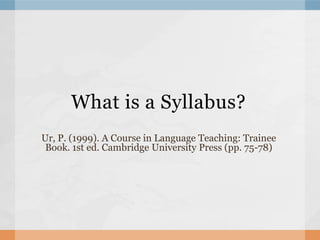Recommended
More Related Content
What's hot
What's hot (20)
Viewers also liked
Viewers also liked (20)
Similar to What is a syllabus
Similar to What is a syllabus (20)
A critical review of recent trends in second language syllabus design and cur...

A critical review of recent trends in second language syllabus design and cur...
A corpus based study of the errors committed by pakistani

A corpus based study of the errors committed by pakistani
More from Sungwoo Kim
More from Sungwoo Kim (20)
Real-time Capture Data in Writing Research: Roundtable in PSU (2009)

Real-time Capture Data in Writing Research: Roundtable in PSU (2009)
What is a syllabus
- 1. What is a Syllabus? Ur, P. (1999). A Course in Language Teaching: Trainee Book. 1st ed. Cambridge University Press (pp. 75-78)
- 2. Etymology syllabus (n.) 1650s, "table of contents of a series of lectures, etc.," from Late Latin syllabus "list," a misreading of Greek sittybos (plural of sittyba "parchment label, table of contents," of unknown origin) in a 1470s edition of Cicero's "Ad Atticum" iv.5 and 8. The proper plural would be syllabi.
- 3. Types of Syllabus 1. Grammatical 2. Lexical 3. Grammatical–lexical 4. Situational 5. Topic-based 6. Notional 7. Functional–notional 8. Mixed or „multi-strand‟ 9. Procedural 10. Process
- 4. Discussion Which type of syllabus is most prevalent? What are some considerations in designing each of the types? Can you think of other innovative types?
- 5. Discussion 2 In Box 12.2 five teachers describe how they use their syllabuses. Consider on your own or discuss with other participants: with whom do you identify most closely?
- 6. A Case Study 3-2-1 Vocabulary: Learning Filmmaking Vocabulary by Making Films http://www.readwritethink.org/classroom- resources/lesson-plans/vocabulary-learning- filmmaking-vocabulary-30683.html?tab=1#tabs
- 7. Standards Common Core Standards State Standards NCTE/IRA National Standards
- 8. Common Core Standards “The Common Core State Standards provide a consistent, clear understanding of what students are expected to learn, so teachers and parents know what they need to do to help them. The standards are designed to be robust and relevant to the real world, reflecting the knowledge and skills that our young people need for success in college and careers. With American students fully prepared for the future, our communities will be best positioned to compete successfully in the global economy.”
- 9. Led by the Council of Chief State School Officers (CCSSO) and the National Governors Association (NGA) As specified by CCSSO and NGA, the Standards are (1) research and evidence based, (2) aligned with college and work expectations, (3) rigorous, and (4) internationally benchmarked. E.g. http://www.corestandards.org/ELA- Literacy/RI/7
- 10. State Standards (CA) http://www.cde.ca.gov/be/st/ss/ http://www.cde.ca.gov/be/st/ss/documents/ela contentstnds.pdf (p. 42 – Grade 7)
- 11. NCTE Standards http://www.ncte.org/standards http://www.ncte.org/library/NCTEFiles/Resour ces/Books/Sample/StandardsDoc.pdf
- 12. 영어과 교육과정 영어과 교육과정 영어과 교육과정의 구조 및 내용을 살펴봅시다. (각각의 교과과정에 공통으로 들어가 있는 요소 파악)

